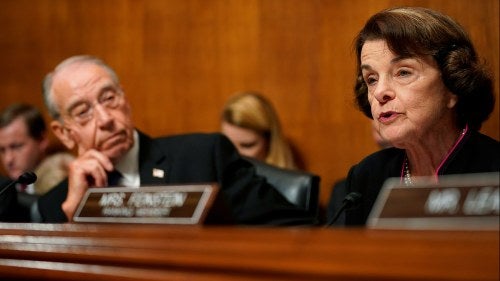Does Older Mean Wiser? US Views on Gerontocracy

While Americans broadly support upper age limits for federal elected officials, age is not their top consideration when choosing a candidate.
Senator Dianne Feinstein recently announced that she would not be seeking reelection in 2024 after spending 30 years representing California in the US Senate. The oldest member of Congress, Feinstein will be 91 at the end of her current term. Despite her decades of service and accomplishments, she has been scrutinized for recent memory lapses with some claiming that she is no longer fit to handle the demands of the Senate. Feinstein and other Democrats have rebuffed these statements, requesting she be treated with respect and dignity for the remainder of her time in office.
This has added fuel to public discourse on the existence of a gerontocracy within the US government, where the few in power are much older than the many who are governed. The average age of the 118th House is 57 years old and the Senate’s average age is 64, while many of the highest-ranking US government officials are close to or over the age of 80. This includes Congresswoman Nancy Pelosi, who recently retired from her position of Speaker of the House at 82, Senate Minority Leader Mitch McConnell, who is currently 81, and Joe Biden and Donald Trump, the two oldest presidents in American history.
While people with decades of experience bring valuable skills to governmental positions, surveys find that Americans support age limits for elected officials. In theory, age or term limits would help encourage a more nationally representative government that reflects the diverse perspectives and policy preferences of different generations within the public.
Demographics of Elected Officials Don't Match the Public
While Baby Boomers (born 1946–1964) and Gen X (1965–1980) make up a combined 50 percent of the US adult population, they currently make up 85 percent of Congress. The Silent Generation’s (1928–1945) representation in Congress is currently about equal to the portion of the public it comprises at about 7 percent. This means that, in total, about 54 percent of Congress is comprised of members aged 60 or older.
The oldest members of Gen Z (1997–2012) are just now reaching the lower age limit for election to the House (25) and thus have only one representative in the 118th Congress. However, Millennials (1981–1996), the second-youngest generation of American adults, are severely under-represented in the legislature. Despite making up 28 percent of the adult population, Millennials hold only 10 percent of the seats in Congress. The issue of overrepresentation is an even bigger problem in the Senate, where Baby Boomers hold two-thirds of the seats and Millennials only hold 3 percent.
Does Age Representation in Government Matter?
Research indicates that it could. First, survey data show that Americans of different age groups do not have the same priorities when it comes to domestic and foreign policy. For example, a January 18–24 Pew survey finds that several issues like controlling immigration and strengthening the military are much higher priorities for older generations than they are for younger ones. Data from the 2022 Chicago Council Survey show that younger generations are more concerned about climate change as a critical threat, and generally express more hesitance about the role of the military in US foreign policy.
Beyond ensuring that a new rotation of policies have the chance to be debated in the halls of Congress, many Americans wish to see their age groups represented in federal legislative bodies. According to a Reuters/Ipsos poll from November 2022, 61 percent of Americans are “concerned that members of Congress are too old to represent the American population.” To deal with the problem, three-quarters of Americans support an upper age limit for members of Congress (75%), per a September 2022 survey by Morning Consult and Insider. This view is shared across party lines and age groups, signaling that the desire for fresh faces in the federal legislative bodies is not limited to one party or just to younger voters.
Age Limits Are Not the Top Priority
While Congressional age limits are popular with the American public, age is not the most important quality voters think about when evaluating candidates. Out of eight aspects of candidates proposed on the same Morning Consult/Insider poll, age was the sixth overall most important factor in their evaluation of candidates. Only about a quarter of the public thinks a candidate’s age is a very important factor (23%), although age in this sense is not specified to mean either young or old. Instead, the public is much more focused on things like candidates’ stances on issues (74%), experience (49%), and health (41%). Nor do younger voters have substantially different priorities: across the generations, Americans put a similar amount of emphasis on the same core characteristics. That being said, experience and health, which are seen as more important by voters, do often correlate with age—positively in the case of experience and negatively in the case of health.
Despite Americans’ apparent preference for more age diversity in the government, the same Reuters/Ipsos poll found that a majority either strongly (24%) or somewhat (41%) agree “leaders who are older often have valuable experience and should not be discounted because of their age.” A February poll conducted by Emerson College found that Biden’s support as the 2024 Democratic nominee was highest among 18–34-year-old Democratic primary/caucus voters, 85 percent of whom think Joe Biden should be the nominee. This support decreases slightly in the 35–49 age group (72%) and the 50–64 age group (61%). Biden has the advantage as the incumbent with 50 years of experience under his belt before being elected as president, suggesting that Democratic voters would rather use that advantage to keep a Democrat in the White House than find a younger nominee.
However, voters do not want experience in office to come at the price of being disconnected with the needs of voters. The Insider poll found that 72 percent of the public would rather have a candidate who is “in touch with the needs and wishes of voters, even if they don’t have as much political experience” than a candidate who “has enough background and experience to serve in political office, even if they aren’t as familiar with the needs and wishes of their voters.”
Biden is currently the oldest president in American history and, for now, it looks like he is the likely Democratic candidate in the upcoming 2024 presidential elections. If reelected in 2024, he will be 85 at the end of his second term. In addition, 34 Senate seats and all 435 House seats will be up for reelection in 2024. Whether the electorate will be persuaded to choose candidates with new ideas over experience remains to be seen.


Related Content
 Public Opinion
Public Opinion
Both Millennials and Gen Z are more hesitant than their elders to endorse military approaches to foreign policy.
 Climate and the Environment
Climate and the Environment
While younger Americans are most concerned about climate change, pluralities of each generation are ready to take action to prevent it.
 Public Opinion
Public Opinion
Younger Americans are more confident in US power vis-a-vis China and are more likely to oppose restrictions on scientific and educational exchanges between the two.
